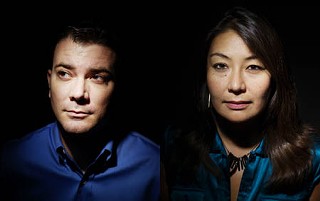A Festival in Transition
Twenty-one years on, aGLIFF reinvents itself
By Clay Smith, Fri., Aug. 29, 2008

Several months ago, an incident that had the potential to embarrass David Sweeney and the nonprofit he directs, the Austin Gay & Lesbian International Film Festival, took place during the Austin Pride Parade. There were about 45,000 spectators lined up on Downtown streets as the parade lumbered past, as parades – even gay ones – tend to do. In addition to inviting two people to serve as grand marshals, the parade's planners had honored aGLIFF by asking it also to lead the parade.
The past several years have not been entirely successful for aGLIFF, as its leaders acknowledge. There have been three executive directors at the festival in the last three years. In July, Sweeney sent out a stark donation plea in which he disclosed that the festival, which is now in its 21st year, could cease to exist if donations don't increase. "Right now, we ... face the very real threat of having to close our doors," he wrote. "We are not a large organization, and as a member-funded organization, we rely on our members to continue operating." aGLIFF board President Alisa Weldon is aware that the festival's programming hasn't been compelling in recent years. "The number one concern for our attendees has been quality of films," she says. "We need to do one thing right ... and that's put on a good festival with quality films." The sense among many of the festival's attendees had been that the lineup of films at aGLIFF felt bloated and irrelevant. It seemed as if aGLIFF, which takes place Sept. 3-7 at the Alamo Drafthouse Ritz, had stalled out.
So when the vintage car that had been donated to aGLIFF for the parade choked up and broke down on the Ann Richards Congress Avenue Bridge, it was an unfortunate but apt metaphor for aGLIFF and its recent troubles. "We're going to have to get out of the parade," Sweeney thought at the time, until people in the crowd ran up to the car and pushed it along until it picked up power again.
Sweeney has a knack for getting himself hired to do jobs that many other people would find insurmountable. Against reams of evidence indicating that young gay men weren't seeking out safe-sex advice, he spearheaded an innovative project in Austin funded by the University of California's Center for AIDS Prevention Studies to creatively persuade young gay men to get tested for HIV and to practice safe sex (he still works part-time for the Center for AIDS Prevention Studies). Sweeney took the helm of aGLIFF in April, at a time when the future of the festival was in doubt because of its precarious finances. ("When I say we're operating lean, we're operating very lean – a festival to festival situation," Weldon says.) The executive director of aGLIFF is "a finance person, a relationship manager, a housekeeper, an office manager – there are all these different roles," Weldon points out. "Sometimes those situations overwhelm people." Although Sweeney isn't naive about his job ("You have no concept of how complicated it is to run a film festival," he says), for him the crucial thing about what happened on the bridge during the parade wasn't that the car broke down but that people came to aGLIFF's rescue. "It's a wonderful metaphor for what happens [at aGLIFF]," he says. "When it stalls out, people come up, and they make it happen."
Sweeney's almost aggressive tendency to accentuate the positive has apparently had an effect on the organization; despite the festival's fundraising difficulties, the lineup of aGLIFF's 96 films is vibrant, idiosyncratic, and also a lot of fun. At just five days long (it previously has run 10 days long), the festival is leaner than in past years, and its new venue, the Alamo Drafthouse at the Ritz, brings aGLIFF back to Downtown. (In recent years, it had been held at the Arbor Cinema near the Arboretum, but before that, it had a longtime home at the Dobie Theatre.) aGLIFF programming director Lisa Kaselak pushed the festival's board of directors to halve aGLIFF's length but says she "didn't get much resistance" on the idea. "I felt like I wanted to have a more concentrated festival that we could market over a shorter period of time that would make it better and less diluted," she says.
Kaselak is in charge of a committee of 17 volunteers who give films being considered for the festival a numerical score. Every film is watched at least twice, but Kaselak, who is in her second year on the job, says that submissions haven't been very good since she's been at aGLIFF. "I largely think that's because we don't have a presence nationally and internationally like we should, and that has to do with funding," she says. "There has to be a presence at the film festivals. We should be a presence at the markets. People would submit if they knew about us."
Since aGLIFF doesn't have the money to send her to film festivals, Kaselak, who is also a filmmaker, has been building relationships with domestic and international distributors so that she can hunt down and procure the kinds of striking movies that aren't currently being submitted to the festival.
Kaselak says there is less cliché in this year's program. "Last year, I felt like I got inundated with the coming-out, teen-angst story, your lesbian love triangle," she says. "There are a lot of these common themes that you see over and over again that a lot of people say defines it as being in the queer market. Our membership is tired of it, and they want to move beyond it." She is seeing more narratives that feature gay characters who aren't depicted as being unique or noteworthy solely because they're gay. "I've seen a lot more narratives that don't have anything necessarily to do with a queer theme – it's queer characters; it's queer lifestyles appropriated into a diverse plot," she says.
At least part of aGLIFF's difficulty in raising money is due to the state of the American economy. "The economy has been vicious with small and midsized nonprofits," Tim Delaney, president of the National Council of Nonprofit Associations, says. "When the economy is going badly, people tend to give to large institutions. Those gifts are appreciated by society, but when those large dollar amounts are flowing to institutions that have a large number of development staff, the small to midsized nonprofits that are the backbone of the system end up with less money."
Like many other nonprofits, aGLIFF suffered when the two people who had been running the organization for 17 years both departed; when Scott Dinger left in 2004 and Sandra Martinez in 2005, the crucial relationships with sponsors that they had cultivated floundered. aGLIFF is still rebuilding after their departure, but Weldon was able to successfully bring aGLIFF's major underwriter, Subaru, back as a sponsor this year. "When I was thinking of leaving, the thing was that this was going to be a shake-up," Dinger says. "To have someone like myself be such a strong figure in it from the beginning is a good thing but also a bad thing. And they've brought in people with new ideas. To just stay the exact course would have been disastrous; I don't think they would have survived."
The most vexing challenge aGLIFF faces, though, is whether its audience thinks that the festival is necessary. "Austin is so unique compared to other cities," Weldon says. "It's so open; it's so positive. There are so many events that are out there [that] it comes down to the community telling us if they want a gay-and-lesbian-specific targeted event." In other words, in a city where gay people tend to feel integrated into the larger society, does a film festival that "spotlights gay, lesbian, bisexual, transgendered, and intersex people as unique," as Weldon puts it, need to exist?
aGLIFF's leadership is obviously operating under the assumption that the answer is yes. About a month ago, Sweeney and Kaselak were spelling out their vision of a perfect aGLIFF. "I would like it to be sold out at every showing and a line wrapped around the door, and we have to schedule extra screenings," Kaselak said. "Actually, I think that's going to happen this year. I'm really excited about the programming." Sweeney listed the various ways the festival is being publicized around town: The Alamo Drafthouse has done a good job of promoting aGLIFF, he said; Whole Foods customers can donate to aGLIFF as they check out; and the festival will have banners hanging over city streets as usual. Then he turned to Kaselak and said, "Actually, we do need to come up with our plan for how we turn people away."
The 21st annual Austin Gay & Lesbian International Film Festival runs Sept. 3-7. Screenings take place at the Alamo Drafthouse at the Ritz. For more information visit www.agliff.org.












